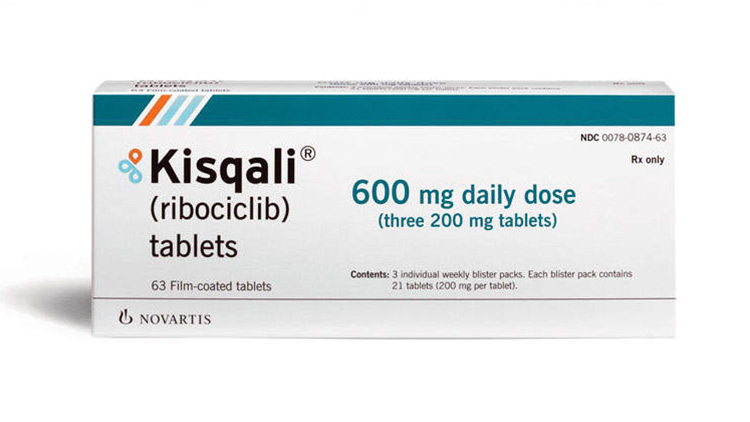Kisqali (ribociclib) vs Keytruda (pembrolizumab)
Kisqali (ribociclib) vs Keytruda (pembrolizumab)
Kisqali (ribociclib) is a CDK4/6 inhibitor used primarily in combination with hormonal therapies for the treatment of HR-positive, HER2-negative advanced or metastatic breast cancer. Keytruda (pembrolizumab), on the other hand, is a PD-1 blocking antibody used in immunotherapy to treat a wide range of cancers, including melanoma, lung cancer, head and neck cancer, and more by enhancing the body's immune response against cancer cells. The choice between Kisqali and Keytruda would depend on the specific type and stage of cancer being treated, as well as the patient's overall health, biomarker status, and previous treatments, and should be made in consultation with an oncologist.
Difference between Kisqali and Keytruda
| Metric | Kisqali (ribociclib) | Keytruda (pembrolizumab) |
|---|---|---|
| Generic name | Ribociclib | Pembrolizumab |
| Indications | HR-positive, HER2-negative breast cancer | Various cancers including melanoma, lung cancer, head and neck cancer, Hodgkin lymphoma, and others |
| Mechanism of action | CDK4/6 inhibitor | PD-1 blocking antibody |
| Brand names | Kisqali | Keytruda |
| Administrative route | Oral | Intravenous |
| Side effects | Neutropenia, nausea, infections, fatigue, diarrhea | Fatigue, musculoskeletal pain, decreased appetite, pruritus, diarrhea |
| Contraindications | Hypersensitivity to ribociclib; concurrent use with strong CYP3A inhibitors or inducers | Severe hypersensitivity to pembrolizumab |
| Drug class | CDK4/6 inhibitor | Programmed death receptor-1 (PD-1) inhibitor |
| Manufacturer | Novartis | Merck & Co. |
Efficacy
Kisqali (Ribociclib) Efficacy in Breast Cancer
Kisqali (ribociclib) is a targeted therapy drug used to treat breast cancer. Specifically, it is approved for the treatment of hormone receptor-positive (HR+), human epidermal growth factor receptor 2-negative (HER2-) advanced or metastatic breast cancer. Ribociclib is a cyclin-dependent kinase 4/6 (CDK4/6) inhibitor, a class of drugs that work by interrupting the proliferation of cancer cells. In clinical trials, ribociclib, in combination with an aromatase inhibitor or fulvestrant, has shown to significantly improve progression-free survival in women with this subtype of breast cancer. The MONALEESA trials, which were key in the approval of ribociclib, demonstrated a substantial delay in disease progression when ribociclib was added to standard endocrine therapy.
The MONALEESA-2 trial, for instance, showed that the combination of ribociclib and letrozole significantly increased progression-free survival compared to letrozole alone in postmenopausal women with HR+/HER2- advanced breast cancer. Similar benefits were observed in premenopausal and perimenopausal women when ribociclib was combined with endocrine therapy in the MONALEESA-7 trial. These findings have established ribociclib as an effective first-line treatment option for patients with this particular type of breast cancer.
Keytruda (Pembrolizumab) Efficacy in Breast Cancer
Keytruda (pembrolizumab) is an immunotherapy drug that has been shown to be effective in treating certain types of breast cancer. It is a programmed death receptor-1 (PD-1) blocking antibody that helps the immune system to detect and fight cancer cells. Pembrolizumab has been studied in breast cancer, particularly in patients with triple-negative breast cancer (TNBC), which is a more aggressive and difficult-to-treat form of the disease. In these patients, pembrolizumab is used in combination with chemotherapy and has been found to improve survival outcomes in those whose tumors express programmed death-ligand 1 (PD-L1).
The KEYNOTE-355 trial provided evidence that pembrolizumab, in combination with chemotherapy, offered a significant improvement in progression-free survival for patients with metastatic TNBC whose tumors expressed PD-L1. This has led to the approval of pembrolizumab for use in this specific patient population. While the results are promising, the efficacy of pembrolizumab can vary based on PD-L1 expression and other tumor characteristics. Therefore, its use is tailored to the individual patient's tumor profile to maximize the potential benefits of the treatment.
Regulatory Agency Approvals
Kisqali
-
European Medical Agency (EMA), European Union

-
Food and Drug Administration (FDA), USA

-
Health Canada

-
Therapeutic Goods Administration (TGA), Australia

-
Medsafe (NZ)

Keytruda
-
European Medical Agency (EMA), European Union

-
Food and Drug Administration (FDA), USA

-
Health Canada

-
Therapeutic Goods Administration (TGA), Australia

-
Medsafe (NZ)

Access Kisqali or Keytruda today
If Kisqali or Keytruda are not approved or available in your country (e.g. due to supply issues), you can access them via Everyone.org.
How it works

Make an enquiry
Choose the medicine you want to buy, answer a couple of questions, and upload your prescription to speed things up. We’ll get back to you within 24 hours.


Make an enquiry
Choose the medicine you want to buy, answer a couple of questions, and upload your prescription to speed things up. We’ll get back to you within 24 hours.


Breeze through the paperwork
We'll guide you through the required documents for importing unapproved medicine, ensuring you have all the necessary information.


Get a personalized quote
We’ll prepare a quote for you, including medicine costs and any shipping, administrative, or import fees that may apply.


Receive your medicine
Accept the quote and we’ll handle the rest - sourcing and safely delivering your medicine.

Some text on this page has been automatically generated. Speak to your physician before you start a new treatment or medication.
Let's talk
If you have any questions, call us or send us a message through WhatsApp or email:
Contact us




